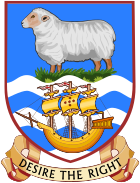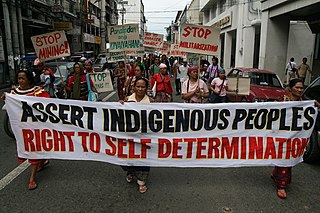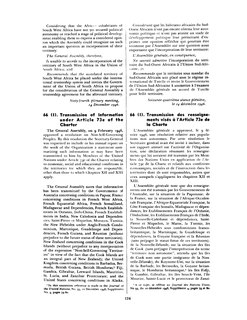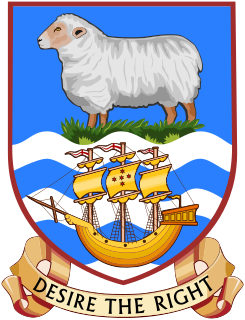 |
|---|
An unofficial status referendum was held in the Falkland Islands on 2 April 1986. The result was 96% in favour of continued British sovereignty, with 88% of registered voters taking part. [1]
 |
|---|
An unofficial status referendum was held in the Falkland Islands on 2 April 1986. The result was 96% in favour of continued British sovereignty, with 88% of registered voters taking part. [1]
The referendum was carried out via a questionnaire sent out by the Falkland Islands Association and the Marplan Institute to all registered voters on the islands. The results of the "Falkland Island Sovereignty Survey" were released by Marplan on 2 April.
| Choice | Votes | % |
|---|---|---|
| British sovereignty | 869 | 96.45 |
| Independence | 15 | 1.66 |
| Argentine sovereignty | 3 | 0.33 |
| United Nations Trust Territory | 3 | 0.33 |
| Other | 11 | 1.22 |
| Invalid/blank votes | 11 | – |
| Total | 911 | 100 |
| Registered voters/turnout | 1,033 | 88.19 |
| Source: Direct Democracy | ||

The right of a people to self-determination is a cardinal principle in modern international law, binding, as such, on the United Nations as authoritative interpretation of the Charter's norms. It states that peoples, based on respect for the principle of equal rights and fair equality of opportunity, have the right to freely choose their sovereignty and international political status with no interference.
National referendums are seldom used in Canada. The first two referendums in 1898 and 1942 saw voters in Quebec and the remainder of Canada take dramatically-opposing stands, and the third in 1992 saw most of the voters take a stand dramatically opposed to that of the politicians in power.
Commonwealth is a term used by two unincorporated territories of the United States in their full official names, which are the Northern Mariana Islands, whose full name is Commonwealth of the Northern Mariana Islands, and Puerto Rico, which is named Commonwealth of Puerto Rico in English and Estado Libre Asociado de Puerto Rico in Spanish, translating to "Free Associated State of Puerto Rico." The term was also used by the Philippines during most of its period under U.S. sovereignty, when it was officially called the Commonwealth of the Philippines.

Chapter XI of the United Nations Charter defines a non-self-governing territory (NSGT) as a territory "whose people have not yet attained a full measure of self-government". In practice, an NSGT is a territory deemed by the United Nations General Assembly (UNGA) to be "non-self-governing". Chapter XI of the UN Charter also includes a "Declaration on Non-Self-Governing Territories" that the interests of the occupants of dependent territories are paramount and requires member states of the United Nations in control of such territories to submit annual information reports concerning the development of those territories. Since 1946, the UNGA has maintained a list of non-self governing territories under member states' control. Since its inception, dozens of territories have been removed from the list, typically when they attained independence or internal self-government, while other territories have been added as new administering countries joined the United Nations or the General Assembly reassessed the status of certain territories.
Sovereignty over the Falkland Islands is disputed by Argentina and the United Kingdom. The British claim to sovereignty dates from 1690, when they made the first recorded landing on the islands, and the United Kingdom has exercised de facto sovereignty over the archipelago almost continuously since 1833. Argentina has long disputed this claim, having been in control of the islands for a few years prior to 1833. The dispute escalated in 1982, when Argentina invaded the islands, precipitating the Falklands War.

The Falkland Islands is an archipelago in the South Atlantic Ocean on the Patagonian Shelf. The principal islands are about 300 mi (480 km) east of South America's southern Patagonian coast and about 752 mi (1,210 km) from Cape Dubouzet at the northern tip of the Antarctic Peninsula, at a latitude of about 52°S. The archipelago, with an area of 4,700 sq mi (12,000 km2), comprises East Falkland, West Falkland, and 776 smaller islands. As a British overseas territory, the Falklands have internal self-governance, but the United Kingdom takes responsibility for their defence and foreign affairs. The capital and largest settlement is Stanley on East Falkland.

The Falkland Islands have a complex history stretching over five hundred years. Active exploration and colonisation began in the 18th century but a self-supporting colony was not established till the latter part of the 19th century. Nonetheless, the islands have been a matter of controversy, as due to their strategic position in the 18th century their sovereignty was claimed by the French, Spaniards, British and Argentines at various points.

The following outline is provided as an overview of and topical guide to the Falkland Islands:

The Gibraltar sovereignty referendum of 2002 was a referendum, called by the Government of Gibraltar and held on 7 November 2002 within the British overseas territory, on a proposal by the UK Government to share sovereignty of the territory between Spain and the United Kingdom. The result was a rejection of the proposal by a landslide majority, with little more than one per cent of the electorate in favour.

The Falkland Islands Constitution is a predominantly codified constitution documented primarily within the Falkland Islands Constitution Order 2008, a statutory instrument of the United Kingdom. The Constitution, in its present form, was made on 5 November 2008 by Queen Elizabeth II in a meeting of the Privy Council at Buckingham Palace. It was laid before Parliament on 12 November 2008 and came into force on 1 January 2009, replacing the 1985 constitution.

Nigel Robert Haywood is a British diplomat, who served as British ambassador to Estonia from 2003 until 2008 and Governor of the Falkland Islands from 2010 until 2014.

An independence referendum was held in the Comoros on 22 December 1974. The overall result was a strong "yes" vote, with 94.57% of voters voting for independence and almost all the "no" votes being cast in Mayotte, where there was a majority for remaining under French control. In contrast, on Mohéli only five out of 6,059 votes were against independence. Voter turnout was 93.3%.
A referendum on political status was held in the Falkland Islands on 10–11 March 2013. The Falkland Islanders were asked whether or not they supported the continuation of their status as an Overseas Territory of the United Kingdom in view of Argentina's call for negotiations on the islands' sovereignty.

The United Nations Special Committee on the Situation with Regard to the Implementation of the Declaration on the Granting of Independence to Colonial Countries and Peoples, or the Special Committee on Decolonization (C-24), is a committee of the United Nations General Assembly that was established in 1961 and is exclusively devoted to the issue of decolonization.

The Crimean status referendum of 2014 was a disputed referendum concerning the status of Crimea, held on March 16, 2014 in the Autonomous Republic of Crimea and the local government of Sevastopol.

Stanley is a constituency of the Legislative Assembly of the Falkland Islands which has been in existence since the first elections in the Falklands in 1949. The constituency of Stanley consists of the area that lies within 3.5 miles of the spire of Christ Church Cathedral. This covers the city of Stanley, which is the largest settlement in the Falklands representing almost 75% of the total population of the islands. Stanley is one of two constituencies in the Falklands, the other being Camp.

An independence referendum was held in New Caledonia on 4 November 2018. Voters were given the choice of remaining part of France or becoming an independent country.

A referendum on reforming the electoral system was held in the Falkland Islands on 24 September 2020, after being postponed from 26 March 2020 following the Coronavirus pandemic. Voters were asked if they wanted to replace the two existing electoral constituencies with a single constituency for the whole of the Islands. Although a majority of those who voted supported the change, the required two-thirds majority in both of the islands' constituencies was not achieved.

An independence referendum was held in New Caledonia on 4 October 2020. The poll was the second to be held under the terms of the Nouméa Accord, following a similar referendum in 2018.